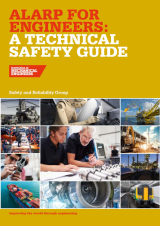Episodes

Monday Jun 06, 2022
Monday Jun 06, 2022
At the dawn of the Industrial Revolution, engineers devoted their efforts almost entirely to making devices that functioned reliably and profitably, but with little attention to safety. Yet frequent disasters, mainly as a result of the growing use of high-pressure steam, led engineers to question increasing numbers of deaths and to assess problems with the technologies they were developing. Indeed, when Richard Trevithick began experiments with high-pressure steam engines to increase both efficiency and power, James Watt (and his partner Matthew Boulton) petitioned Parliament to pass an act outlawing the use of such engines as a public danger.
The protection of people from harm has increasingly been a focus of many fields of engineering since the nineteenth century. Over time, engineers began to propose design changes and build-in innovations to reduce risk, and thus the industry of safety engineering was born.
Safety engineering deals with accident prevention, reducing the risks associated with human error, and integrating safety benefits in engineered designs. The purpose of safety engineering is to control risk by reducing or completely eliminating it. It also aims to reduce the rate of failures and if failures do occur, that they are not life threatening. This work has led to the development of safety codes and standards governing technology design, including the use of natural gas and electricity, the building and use of steam boilers, and the storage and use of explosives.
Engineering societies and institutions like the IMechE, whose original charters stressed the promotion and facilitation of the profession's work, where, by the mid-twentieth century, beginning to impose safety as a primary moral duty of the engineer.
Today there are many engineers whose work is devoted entirely to the protection of the public and workers from the hazards of technology and natural phenomena such as Fire protection engineering and automobile safety.
Today these engineers often make use of computer models, prototypes, or recreations of situations to assess potential hazards and risks such as crash testing, and consider not only the situation or use of the product but the design processes applied, material reliability, legislation, and human factors.
The intertwining of engineering and safety will undoubtedly intensify in the future in response to constantly rising public expectations and the ubiquitous use of technology in our lives. So how do we make those risks as low as reasonably practicable?

In this months episode Helen discusses why safety and risk play such a key role in engineers’ decision making processes, the need for safety legislation and its impact, and how engineers mitigate risks using ALARP with guest chartered engineer Keith Miller, Technical Safety Consultant and one of the lead authors of the IMechE’s ALARP for Engineers Guide, published in 2021.
Useful Links:
ALARP for Engineers - A Technical Guide
"Engineers work in many disciplines but all of them have the ability to affect societal wellbeing to a very significant extent. The privilege of having the skills and knowledge to contribute so much to such important areas of life clearly brings with it the need for wise ethical judgement when exercising that privilege."
Royal Academy of Engineering 2011
With power comes great responsibility, and as engineering professionals we exercise significant power over the decisions we make on behalf of society every day. Just like doctors, Engineers are faced with ethical dilemmas where they can find themselves making life or death decisions.
Engineering ethics is a growing field of study that looks at the moral decision-making that applies to the practice of engineering. The field examines and sets the obligations by engineers to society, to their clients, and to the profession as a whole.
Engineering professionals work to enhance the wellbeing of everyone, and in doing so, they are required to maintain and promote high ethical standards and challenge unethical behaviours.
There are four fundamental principles for ethical behaviour and decision-making outlined by the Royal Academy of Engineering & the Engineering Council which include.
- Honesty and integrity
- Respect for life, law, the environment and public good
- Accuracy and rigour
- Leadership and communication
As a professional body, The IMechE expects its members to maintain high standards of ethical conduct which requires us to ‘Protect members of the public’, ‘Protect IMechE members’ and ‘Uphold the reputation of the Institution and the wider engineering profession’.
To achieve this we have a ‘Code of Conduct’ which outlines these requirements and to which members are expected to abide by.
In the second segment of this episode, Helen talks with fellow of the IMechE, past Trustee and Council member Matt Garside to get a personal view of the importance of ethics in engineering, why engineers should use their privilege wisely and how engineers will safeguard society in the future.
Useful Links:
RAE Webinar on Ethics in Engineering
Engineering Council Statement of Ethical Principles
We would love to hear your thoughts and comments on this episode. If you would like to get in touch, email us at podcast@imeche.org
You can find more information about the work of the IMechE at www.imeche.org

